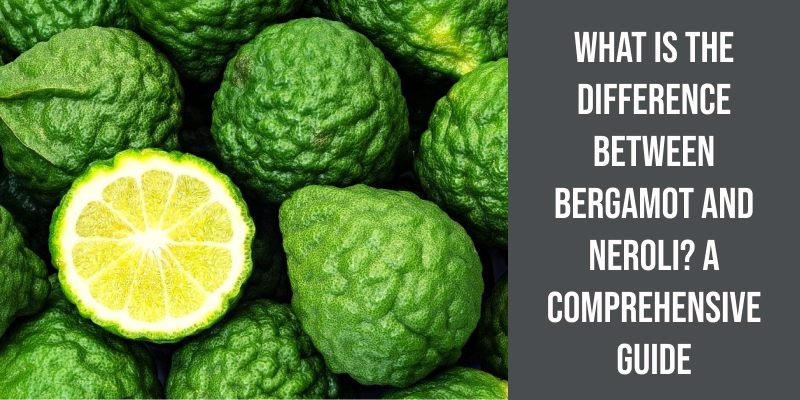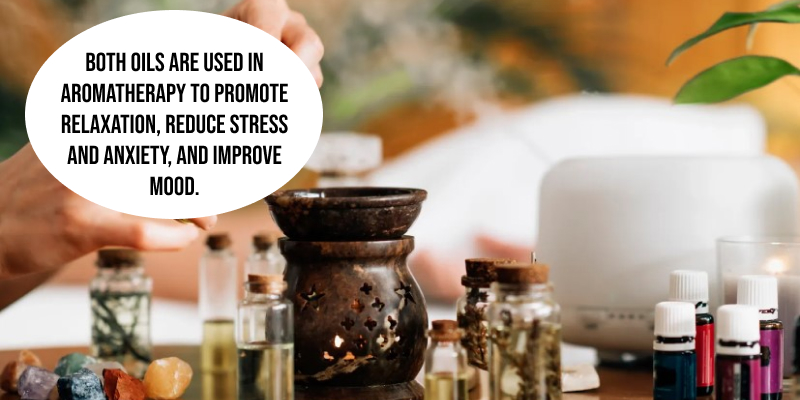Bergamot and Neroli are both essential oils derived from citrus trees, but they differ in a variety of ways. Bergamot, harvested from the peel of the bergamot orange, has a fresh, citrusy scent often linked to Earl Grey tea. It is frequently used in aromatherapy for its uplifting and mood-enhancing properties. On the other hand, Neroli oil comes from the blossoms of the bitter orange tree, offering a sweet, floral aroma. This oil is used frequently for its calming effects and in skincare for its ability to revive skin at a cellular level. Both have their unique properties and uses, and their aromas differ in being citrusy-fresh and floral-sweet respectively.

One of the main differences between neroli and bergamot is their origins. Bergamot is extracted from the peel of the bergamot orange through a process called cold pressing. The result is a spicy floral fragrance that’s distinctly different from neroli. While both scents are often used in perfumes and colognes, bergamot is more commonly associated with masculine fragrances.
They’re often combined with other fragrances to create unique and interesting blends. When used in the right amounts, both scents can be appealing to both men and women.
Neroli and bergamot are two essential oils that have been widely recognized for their therapeutic benefits. In aromatherapy, these oils are known for their calming and relaxing effects, which can help reduce stress and anxiety. When paired with Epsom salts, the combination can be especially powerful, offering a soothing and rejuvenating experience for both the body and mind. But beyond their stress-reducing properties, what else can neroli and bergamot do for you? Let’s take a closer look.
What Is Neroli and Bergamot Good For?
Neroli and bergamot are two essential oils that have gained popularity due to their therapeutic properties and unique fragrance. Neroli is derived from the flowers of the bitter orange tree, while bergamot comes from the Citrus bergamia fruit. Both oils are used in aromatherapy to promote relaxation, reduce stress and anxiety, and improve mood.

When used in combination with Epsom salts, neroli and bergamot can help to soothe tired muscles and ease tension in the body. Epsom salts are a natural source of magnesium, and when combined with warm water, they can help to increase blood flow and promote relaxation.
Neroli oil is said to be beneficial for the skin, helping to reduce the appearance of scars, stretch marks, and wrinkles. It’s also believed to have antibacterial properties, making it useful for treating acne and other skin conditions. Bergamot oil has been studied for it’s antioxidant properties, which may help to protect cells from damage caused by free radicals.
When used regularly, this blend can also have a range of health benefits, making it an excellent addition to any self-care routine.
How to Properly Use Neroli and Bergamot Essential Oils for Aromatherapy
Neroli and bergamot essential oils are commonly used in aromatherapy. It’s recommended to dilute these oils with a carrier oil like coconut oil or almond oil before use. When using neroli oil, it’s best to inhale the aroma directly or use a diffuser. Bergamot oil can be mixed with a carrier oil and massaged onto the skin or added to bathwater for a relaxing experience. However, it’s important to follow proper dilution guidelines and consult with a healthcare professional before using essential oils.
Is Neroli a Feminine Scent?
Neroli, also known as orange blossom, has long been regarded as a feminine scent due to it’s sweet and soft fragrances. However, in recent years, it’s become increasingly popular among men as well. Neroli is extracted from the blossoms of the bitter orange tree. While it’s traditionally been used in perfumes and colognes geared toward women, many men find the scent to be alluring and captivating as well.
Neroli is considered a unisex fragrance note, meaning it can be appreciated and worn by individuals of any gender. Its light and uplifting floral character makes it suitable for both men and women, and it is often used in a variety of perfumes, colognes, and skincare products.
The perception of whether a fragrance is considered feminine, masculine, or unisex can vary across different cultures, traditions, and personal preferences. Historically, floral fragrances were often associated with femininity, but modern perfumery has expanded beyond traditional gender-based scent categorizations.
Ultimately, the idea that certain scents are exclusively feminine or masculine is becoming less relevant as people are more open to wearing fragrances based on personal preference and how they resonate with their individual body chemistry. Neroli’s fresh and floral aroma makes it a popular choice for individuals seeking a light, uplifting, and versatile fragrance note, regardless of their gender.
What Are Other Names for Bergamot?
Bergamot, a citrus fruit with a unique and aromatic flavor, is also known by various other names depending on the region or language. Some of the alternative names for bergamot include:
- Citrus Bergamia: This is the botanical name for the bergamot fruit.
- Bergamot Orange: Bergamot is often referred to as “bergamot orange” due to its citrusy nature and its resemblance to oranges.
- Bergamot Lemon: In some places, it is called “bergamot lemon” because of its lemon-like fragrance and flavor.
- Citrus Aurantium Bergamia: This is another botanical name for bergamot, indicating its classification within the Citrus aurantium species.
- Bergamot Lime: In certain regions, the fruit is known as “bergamot lime” due to its lime-like qualities.
- Bergamot Citrus: The name “bergamot citrus” emphasizes its citrus origin.
- Earl Grey Orange: Bergamot is a key flavoring ingredient in Earl Grey tea, and in some cases, it may be referred to as “Earl Grey orange.”
- Bois de Rose: In Brazilian Portuguese, bergamot is called “bois de rose.”
- Bergamota: This is the name for bergamot in Spanish and Portuguese.
- Bergamotier: In French, bergamot is known as “bergamotier.”
Aside from it’s use in teas and cooking, the essential oil derived from bergamot is also used in aromatherapy. It’s believed to have calming properties that can reduce feelings of anxiety and stress. As such, it’s often included in blends for diffusers and massage oils.
Bergamot is also a popular ingredient in the perfume industry. It’s citrusy scent is often used to add fragrance to perfumes, colognes, and other scented products. In addition to it’s use in fragrances, bergamot oil is sometimes added to skin care products to help improve the appearance of oily or acne-prone skin.
In the Italian region of Calabria, bergamot is a prized ingredient in the production of Earl Grey tea. The oil extracted from the rind of the bergamot fruit is used to flavor the tea, giving it it’s distinctive taste. The production of bergamot oil is so important to the region that it’s been granted protected geographical indication status by the European Union.
Historical Uses of Bergamot in Medicine and Traditional Healing Practices.
Bergamot has been used in traditional medicine for centuries, with historical accounts suggesting it was used to treat a variety of conditions such as fevers, infections, and digestive issues. It was believed to have anti-inflammatory properties and was used as an antiseptic and analgesic agent. Bergamot oil was also used in aromatherapy to alleviate stress and anxiety. However, it’s important to note that these historical uses haven’t been scientifically proven, and bergamot shouldn’t be used as a substitute for modern medical treatments.
While bergamot is a versatile scent that blends well with many other fragrances, some may wonder if there are any scents that come close to it’s unique aroma. Let’s explore some options and discover what other essential oils and fragrances offer similar notes and benefits.
What Scent Is Similar to Bergamot?
Bergamot is a citrus fruit with a distinct sweet and tangy aroma that’s commonly used in perfumes and other scented products. It’s often compared to the scent of oranges or lemons, but with a more complex, nuanced character.
Jasmine has a sweet, floral aroma that’s often used in perfumes and other scented products for it’s intoxicating fragrance.
Finally, vetiver is a scent that’s often paired with bergamot.
When it comes to pairing bergamot with other flavors, there are plenty of options that can enhance it’s unique taste and aroma. In addition to the classic citrus fruits, there are some unexpected matches that can bring out the best in this aromatic fruit. From the distinctive taste of gin to the subtle sweetness of chamomile, here are some of the most complementary flavors to try with bergamot.
What Flavors Pair Well With Bergamot?
Bergamot is a citrus fruit that’s known for it’s unique flavor, which is a combination of sweet and spicy with a slightly bitter aftertaste. Because of it’s distinctive taste, it’s become a popular ingredient in various culinary dishes, especially those that require a strong and complex flavor.
One of the most popular flavors to pair with bergamot is gin, which is a well-known alcoholic beverage that already incorporates botanical flavors. This combination is often found in popular cocktails such as the Earl Grey Martini or the Bergamot and Gin Fizz.
Lemongrass is another ingredient that pairs really well with bergamot. When combined, they create a unique flavor that works well in soups, stir-frys, and curries.
Chamomile is a mild-tasting herb that pairs well with bergamot. When combined, they create a relaxing and soothing tea that’s perfect for winding down at the end of the day. The combination of these two ingredients creates a floral aroma that enhances the overall flavor. The combination is perfect for individuals looking for a little bit of relaxation in their daily routine.
Other lesser-used citrus fruits, such as yuzu and kumquat, also pair well with bergamot and are often used in Japanese cuisine.
By experimenting with different flavor pairings, you can create a delicious and unique dish that’s sure to impress.
Conclusion
In conclusion, while both bergamot and neroli come from the same family of orange trees, they’re vastly different in terms of their scent, method of extraction, and therapeutic properties. On the other hand, neroli is derived from the white flower blossom and has a sweet, floral scent. However, both oils offer unique benefits and have the ability to positively impact our mental and physical health. It’s important to educate ourselves about the various essential oils available to us in order to make informed decisions about which to use for different purposes. Ultimately, exploring the world of aromatherapy can lead to a greater understanding of the natural gifts that plants offer us.





